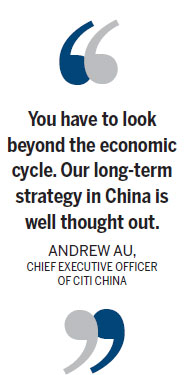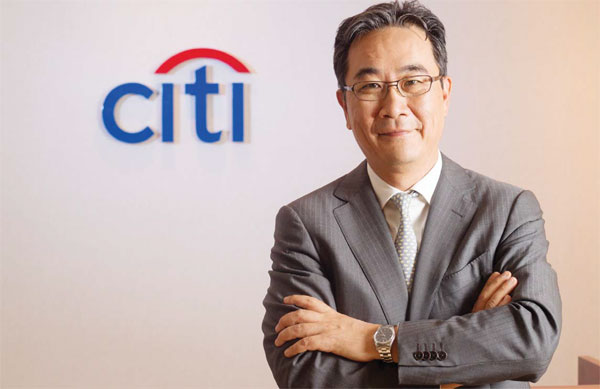Visions of a true believer

China's slower GDP growth is still the envy of the world, says CEO of Citi China
Despite many in world business remaining increasingly concerned about the slowdown in the Chinese economy, Andrew Au still insists the "China story" remains very much alive.
The chief executive officer of Citi China says before anyone gets too carried away writing off the world's second-largest economy, they should keep firmly in mind that although China may be growing at a slower pace, the absolute size of its incremental GDP generated every year is still considerably bigger than before.
| Andrew Au, chief executive officer of Citi China, says Citi has been serving Chinese companies going global for a long time. Gao Erqiang / China Daily |
"Even at more managed growth of between 6 percent and 7 percent, China's GDP number is still the envy of the world," says the country head of the US bank which has offices in every corner of the globe.
"You have to look beyond the economic cycle. Our long-term strategy in China is well thought out. It is, as its name implies, long-term in nature. China is a marathon, not a sprint."
Citi's commitment to China during what has appeared to the outside world as a troubled economic cycle, he says, stems from its long history here, which dates back to 1902 when it first established an office in Shanghai.
A 31-year veteran of Citigroup Inc, Au joined the banking giant in 1984 after it had re-entered the Chinese mainland in Shenzhen, Guangdong province, a year earlier.
It was fully incorporated in China in 2007, and he was named CEO of Citi China the following year.
After seven years at the local helm, he says its long and solid local track record here and its commitment to always putting its clients first means the company has been able to build its business in the country and expand its business.
Citi has strong retail and institutional businesses in China and was the first global bank to launch a sole branded credit card in 2012.
But maybe just as important, it has been able to hold onto its staff and become an integral part of not only the country's business community, but of its local community well beyond banking.
Over the past decade, as an increasing number of Chinese companies have expanded their presence globally, this has played strongly to Citi's strengths of having an international network covering more than 100 countries and territories.
"There is so much talk of emerging global champions among the Fortune 500, and it's important to realize that 92 of those companies as of 2014 are currently from China," Au says. He adds that the bank's priority is to ensure these Chinese global champions are using Citi's global network as they expand.
Funding, of course, remains crucial for many Chinese firms looking outside their own shores, whether for mergers, acquisitions or expansions, and Citi has stepped up its efforts to help its local clients access different capital markets to help them in the transition.

For instance, it has helped clients issue corporate bonds in multiple capital markets, and extended medium-to long-term foreign currency loans to help many take advantage of low-cost overseas funding options, too.
Last year, the bank helped raise more than $15 billion (13 billion euros) for Chinese companies from global capital markets, including international bonds for state-owned enterprises in the oil and gas industry, and led Asia's largest ever global corporate bond offering for Alibaba Group Holding Ltd.
Au says Citi has been "serving Chinese companies going global" for a long time, and this dedication to its local client base is no better illustrated by the company's setting up of eight "China Desks" around the world, staffed by Chinese-speaking business experts to support Chinese companies wherever they operate.
The specialist staff also organize regular "China Days" for customers in different countries so they can be kept abreast with the latest business and economic developments in the market.
"My philosophy is that for China to succeed, it is not enough for only people in China to know about the country," says Au. "You need the entire international network to understand China and at the same time our local staff have to understand the global business network."
With that very much in mind, Citi also has an extensive work-exchange system in place, allowing staff from its international network to come to work in China, as well as up to 30 Chinese staff being placed around the world, some on short-term assignments but most for assignments lasting up to three years.
The thinking behind the exchange network, says Au, is simply to promote better contact between employees, clients and global business partners.
As with many business sectors, Citi is also embracing the idea of the Belt and Road Initiative - the economic blueprint proposed by President Xi Jinping in 2013 to develop deeper economic cooperation among countries along a trade and infrastructure network that includes the Silk Road Economic Belt and the 21st Century Maritime Silk Road. The network connects Asia, Europe and Africa and passes through more than 60 countries and regions with a population of about 4.4 billion.
Citi expects to find itself working with not only Chinese corporations investing along the Belt and Road, but also indigenous corporations in the countries along the routes where it already has a presence.
The fledgling Asian Infrastructure Investment Bank, too, is firmly on Au's radar as offering it opportunities regionally, because the global bank already has long experience of working with multilateral agencies.
Citi has already found itself at the heart of various multilateral collaboration agreements that have helped Chinese companies go global, he says, and has been an active partner in using its huge reach to introduce the yuan, or renminbi, as a currency which is well suited to international use.
China started on its journey to internationalize the currency in 2009, and Citi was right there from the get-go, "starting out in Hong Kong and then quickly expanding our ability to other parts of the world".
It has also managed the selling of dim sum bonds for clients in Hong Kong, as well as arranged seminars to promote the use of the Chinese currency in its offices around the world, advising clients on, among others issues, how best to open and operate a renminbi account to handle trade globally.
"We believe there will be more and more companies using the renminbi. Every multinational will need to have experience in renminbi because I have no doubt it will become a major international currency, much like the US dollar and the euro," he says.
Au describes himself, maybe modestly, as "a relatively serious manager", and says his management philosophy is driven by total trust in his team and knowing how important it is that each member works best together.
"My team members are often closer to the issues than I am, but of course as CEO I am kept informed and up to date."
jiangxueqing@chinadaily.com.cn
(China Daily European Weekly 09/18/2015 page21)
Today's Top News
- Japan tempting fate if it interferes in the situation of Taiwan Strait
- Stable trade ties benefit China, US
- Experts advocate increasing scope of BRI to include soft power sectors
- New engine powers cargo drone expansion
- China to boost green industry cooperation
- Manufacturing PMI rises in November































